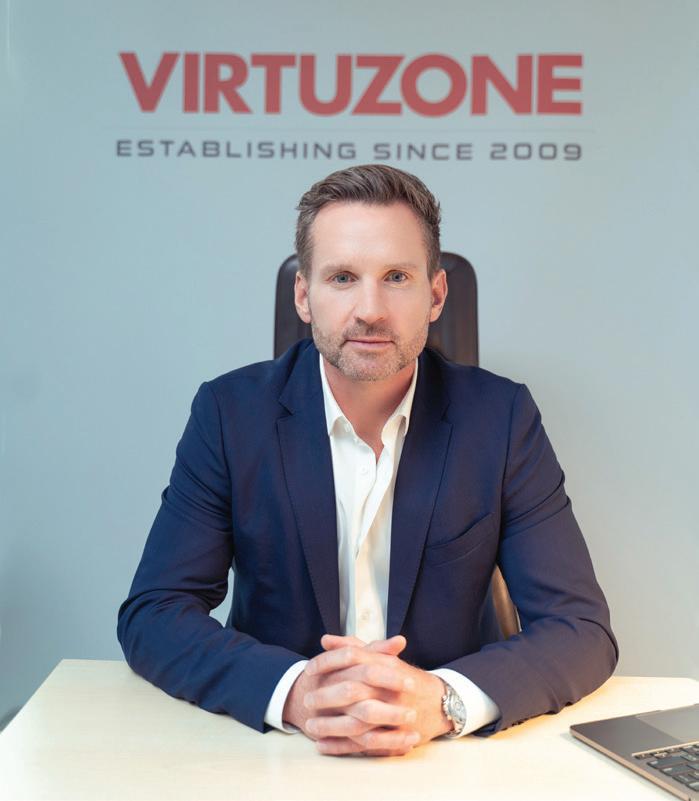
4 minute read
Creating an enabling environment
from May June 2021
by MEA Business
Geoff Rapp, Co-founder, Virtuzone, sheds light on how the UAE’s extensive adoption of technology can spur sustainable future growth in the face of global economic upheavals such as the coronavirus pandemic
In which areas/sectors do you expect to see the most “disruption” in the future?
Advertisement
The adoption of Artificial intelligence (AI) and Machine Learning (ML) is one of the biggest disruptors and it is not limited to any certain sector or industry. The outbreak of the COVID-19 pandemic is accelerating digitalization at a faster pace than initially anticipated and the integration of AI solutions into operations, products, or services by different businesses is far from over. Digitalization is already evident in the retail sector, manufacturing, banking, gaming, etc. The possibilities are endless.
Businesses are looking for more and improved solutions to provide personalized services without compromising productivity – and AI can help them bridge that gap. The adoption of AI and ML has the potential to grow in the Middle East. PwC projected that the Middle East region’s AI industry will be valued at $320 billion by 2030 and $96 billion of that will be in the UAE.
We expect more disruption in telecommunications infrastructure and blockchain technology. The pandemic is forcing several people to work remotely, which is driving the demand for reliable and advanced telecoms solutions. We also expect to see a surge in videotelephony software that allows people to collaborate efficiently even if they are working remotely such as Zoom. This includes programs that allow employees to stay aligned and updated with their projects, allowing cohesive operations, data sharing and reporting, among other things. As the Middle East region progresses towards a borderless business economy, whose bedrock is a strong digital infrastructure as well as a reliable and accessible telecoms system.
In the future, both consumers and businesses will require a stricter and more invincible digital ecosystem, as they increasingly do business digitally. Blockchain can provide that higher level of security, as well as higher efficiency through the provision of real-time information updates and better transparency. Similarly, we also see significant disruptions in the academic sector, retail and finance.
How can the UAE further encourage positive disruption and innovation?
In the Middle East region, the UAE is doing well when it comes to introducing and implementing initiatives to support innovation. The government unveiled innovation labs, funding programs and accelerators for tech-driven companies, as well as other initiatives to speed up the development and adoption of tech solutions. These include the Mohammed Bin Rashid Innovation Fund (MBRF) and the Dubai Future Accelerators. The UAE is also keen on building smart cities and we expect the Expo 2020 Dubai to introduce new technologies that will be further integrated into the country’s sectors.
To accelerate the adoption of innovative technologies and support disruption, the consumers must be enlightened on the merits of using such technologies to prepare them for the change that is coming.
Which sectors do you think the UAE should focus on to make the economy more resilient, self-sustaining and less dependent on variables such as the prices of oil and gas and tourism?
By establishing the UAE as the global hub for innovation, the country can attract innovators, investors, professionals, and special talents. These groups can come and establish their business or practice their professions in the UAE because they have access to funding, R&D, facilities, government support and among other things. This can be a major contributor to sustainable growth in the UAE in the future and this includes the fintech secGeoff Rapp, Co-founder, Virtuzone.
tor, robotics, automation tech, agritech, etc.
The UAE is already an established hub for international trade, especially in the MENA region. The country’s borderless economic system ensures business continuity despite global shockwaves such as the COVID-19 pandemic and the 2008 financial crisis. Investors can stay in the UAE and continue running their businesses anywhere globally. The borderless system also allows UAEbased and registered firms to continue operations internationally.
With international trade and e-commerce booming, the shipping and logistics sectors will play a crucial role in ensuring that goods are transported efficiently and safely. The demand for logistics and transportation facilities is expected to expand in the future and there is a need to build a system that can be easily scaled up to accommodate increasing demand while ensuring uninterrupted growth.
Tourism will remain a key contributor to the UAE’s economy. Despite the travel and movement restrictions to curb the spread of the pandemic, Dubai remains a top destination for international tourism, especially for European travellers. The UAE government’s swift response to address the pandemic has helped local tourism to bounce back, and though it is still sluggish compared to pre-pandemic levels the signs of recovery are there and we expect the sector to recover further as the country increases its inoculation drive.










